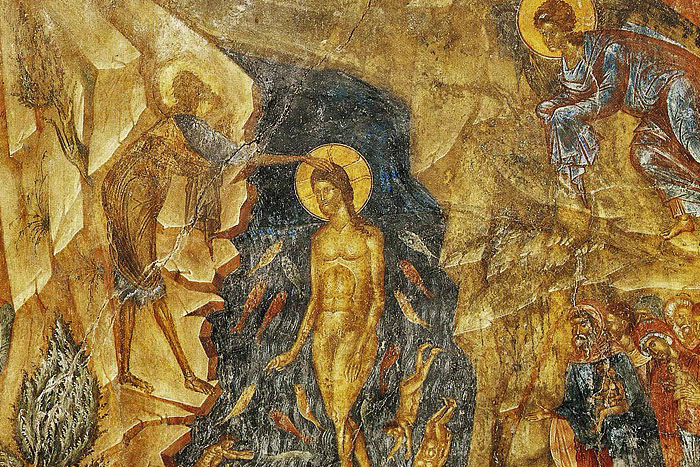
Do you ever ask: “If Jesus is who He says He is, why don’t I see Him more clearly?” St Thomas had the same doubts when his brother disciples told him that Jesus had resurrected. Jesus heard his plea and answered it: “Then He (Jesus) said to Thomas, “Put your finger here, and see my hands; and put out your hand, and place it in my side; do not be faithless, but believing … Thomas answered him, ‘My Lord and my God!’” (John 20 27-28).
Yet if Thomas got such a visible sign, why does it seem we are left in the dark? Could it be that we don’t know how to listen? Look at communication in today’s world for example. So much of the media is overpowering. It ranges from the lyrics of rap music to the pulsating beat of rock and roll, to commercials played everywhere it seems, even to muzak in bathrooms and television in fast food shops — all of it is calculated to appeal to the senses. Some Christian churches even lace their services with splashy music and Las Vegas style light shows. What does any of this have to do with God?
We have all this noise and distraction because the world wants to hold us captive, and the path to our incarceration is through the senses. The human body can be captivated by the senses. Sounds, smells, tastes, and what our eyes behold can become an intoxicating delight. And when it wears off, it takes more sounds, stronger smells and tastes, and greater visual stimulation to renew the intoxication.
But whose work is this: God’s or the evil one?
The Church Fathers noted the problem years ago. St. Ilias the Presbyter wrote: ” … the light of the spirit has grown dim within the soul, whereas the light of the sensible world shines more brightly within it” (Philokalia III). What St. Ilias means is that a person drunk on sensory stimulation will crowd out the light that burns naturally in the soul. Push it aside far enough and the light will dim to almost nothing.
How do we find God? “God is a Spirit, and those who worship Him must worship Him in Spirit and in Truth,” the Scripture teaches (John 4:24). The worship begins with a silencing of the heart and mind so that the soul can receive Him. St. Didochos of Photiki said: “.. but where there is richness of the Spirit, no speech is possible. At such a time the soul is drunk with the love of God and, with voice silent, delights in His glory” (Philokalia I). He means that the focusing on sensory things alone cannot lead us to God. Further, when the focusing becomes extreme we enter idolatry.
The self-manifestation of God is not apprehended through sensory experience but in the stillness of the soul. Encountering God is by necessity quiet and peaceful. God comes to us when we prepare ourselves to receive Him by bringing our senses under control, by elimination the noise and clamor in the world, and by refusing the intoxication the world offers through our senses.
And this manifestation replicates in its own way the physical manifestation of Jesus as the Son of God at Theophany (the Baptism of Christ): ” … And I saw the Spirit of God descending like a dove, and alighting on Him; and lo, a voice from heaven, saying, “This is my beloved Son, with whom I am well pleased” (Matthew 3:16-17).
Sensation Seeking
How do we break free of sensory captivation? Contemporary empirical findings in scientific psychology lend insight into how this psycho-spiritual intoxication takes place. Zuckerman (1993) found a personality dimension he termed sensation seeking. Persons scoring high on this dimension have a “generalized preference” for high levels of sensory stimulation. They constantly look for fresh exhilarating experiences. Zuckerman reported a strong genetic predisposition for this personality trait.
High sensation seekers are inclined 1) to thrill and adventure seeking such as skydiving; 2) to unusual activities such as wild parties; 3) at the extremes are usually disinhibited thus prone to heavy drinking, drug use, gambling and sexual experimentation; and 4) exhibit a susceptibility to boredom with low tolerance for routine repetition. While few persons are at the extreme, even those moderately inclined toward sensation seeking prefer external sensory stimulation over internal reflection. It is easy to see how such individual can miss the unknown God who reveals Himself in silence. They simply don’t know this dimension of human experience.
What might be helpful for anyone inclined to sensation seeking is to develop a spiritual rule. Many Church Fathers have pointed out that it is better to say one prayer deep from the heart, than many prayers in a routine and superficial way. Persons disposed to high sensation seeking might keep their prayers, meditations, and quite times short but open to God revealing Himself, and in particular listening for His voice.
Theophany and Free Will
God reveals His Son in the silence of our soul. Why might God do this? One reason is that communion with God requires our active participation. Our will must be conformed to God’s will.
Take the Holy Scriptures. Many passages are not clear cut. Under the inspiration of the Holy Spirit guidance our Church and the Holy Fathers, we have to struggle to make sense of them. When we look at the Lord’s life as recorded in scripture for example, we always see an ambiguity. Almost everything Our Lord did demand an interpretation that we must provide. Our inner orientation — our capacity to see and understand — must be developed in order to see who the Lord really is. The Pharisees, Sadducees, and Scribes continually saw the work of Jesus but concluded He was a malefactor. Those with purity of heart saw the same works but concluded that Jesus was the Son of God, the Good God who loves mankind. Which ones are we?
Meditate on the Troparion (hymn) of the Theophany:
Lord, when You were baptized in the Jordan, the worship of the Trinity was made manifest. For the voice of the Father gave witness to You, calling You Beloved; and the Spirit, in the form of a dove, confirmed the certainty of His words. Glory to You, Christ our God, who appeared and enlightened the world.
If we experience the Theophany within ourselves, we will see the Lord all around us. The psalmist says “The heavens declare the glory of God, and the firmament declares His handiwork (Psalm 19:1). If we listen on the inside, we will see clearly what lies on the outside. The senses are freed and clamor of the world loses its power over our minds and hearts so that the Lord might reveal Himself to us more and more.
Source: https://orthodoxlogos5.wordpress.com/2014/01/06/a-theophany-within-by-fr-george-morelli/



